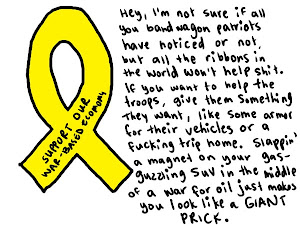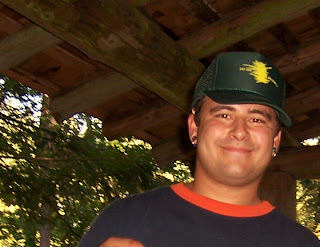Thursday, November 29, 2007
7 Reasons to Legalize Marijuana
Yearly drug mortalities: Tobacco, 340-400,000; Alcohol, 125,000; Caffeine, 1000 to 10,000; Legal drug overdoses, 14-27,000; Illicit drug overdoses, 3800 to 5200; Aspirin, 180 to 1000 Marijuana, 0. —US Surgeon General
Just writing the title for this article feels a bit criminal. The War on Drugs has gotten us to the point where saying anything positive about marijuana makes you an immoral, youth-corrupting, teasonous jerk. Yet, the first casualty in the drug war was the truth. In our national frenzy to eradicate certain (but not all) types of drug use, we have become mired in a swamp of lies that do more damage to our nation than any drug ever could.
One does not have to be a past, present or would-be marijuana user to care deeply about this issue. The criminalization of marijuana has negative consequences that affect us all. Even such arch-conservatives as William Buckley, George Shultz and Milton Friedman have called for the legalization of marijuana. Their bottom line: fighting a war against marijuana constitutes a monumental waste of resources.
Marijuana is a common plant that has grown wild around the world for thousands of years. From 1000 B.C. until the late 1800s, it was the planet’s most widely-cultivated crop. Its psycho-active properties have long been important to many cultures for medicinal, spiritual and recreational purposes. There are hundreds of productive uses for which marijuana provides an ideal source material. Yet since 1937, the US has made the cultivation, possession and use of marijuana a venal and stringently punished crime. This is great foolishness with dire consequences. It is time for a change.
Criminalization creates crime
Prohibition goes beyond the bounds of reason in that it attempts to control appetite by legislation, and makes a crime out of things that are not crimes. —Abraham Lincoln
An estimated 10% of prisoners currently held in federal prisons were arrested for marijuana cultivation, possession and/or use. These people were not running huge quantities of drugs across our borders, or selling drugs to children, or in any way endangering other people. They were simply growing or using marijuana, usually in the privacy of their homes.
For this so-called crime against society we now demand mandatory sentences of twenty years to life, often without parole. The marijuana user will he in jail long after the rapist, armed burglar and kidnapper have been released. Indeed, our prisons are now so overcrowded with non-violent drug users that truly dangerous criminals are often put back on the streets for lack of space. Likewise, our police are so busy arresting non-violent drug users, and our courts so burdened with hearing their cases, that genuine threats to our society are that much harder to address.
It costs about $20,000 a year to incarcerate a federal criminal. That’s a half a million dollars per marijuana user if we hold him or her for twenty-five years. And it is likely that their time in jail will only turn marijuana users into real criminals, an added bonus for society when we get around to releasing them.
Criminalization is unconstitutional
In every society, the use of one or a small number of drugs is not only tolerated, but actively encouraged and promoted. And that goes hand in hand with defining all other drugs as “bad.” —Dr. Andrew Weil
Nowhere in the US Constitution is there support for the criminalization of marijuana or for the resulting war against peaceful US citizens, The Constitution clearly protects as primary each individual’s right to life, liberty and the pursuit of happiness. The Founders understood that government should intervene in its citizens lives only when someone’s actions are harming someone else’s body or property. Marijuana users generally do neither.
The Constitution does specifically ban cruel and unusual punishment. Is it not unusually cruel to seize property, to utterly ruin lives, and to incarcerate people for twenty and more years for the growing of a common plant? Or for the decision to smoke that plant in the privacy of one’s home?
Ironically, the first draft of the Constitution was written on paper made from marijuana (or “hemp” — marijuana’s blue-collar name). Hemp was such an important product in the 1700s that farmers were required to grow it. And there is evidence that some of our Founding Fathers, after long days of fostering rebellion, liked to kick back and smoke a bowl or two of Colonial Hemp.
Criminalization obstructs free enterprise
The greatest service which can be rendered any country is to add a useful plant to its culture. —Thomas Jefferson
The marijuana plant provides a soft yet durable fiber that is ideal for countless purposes in the textile, papermaking, and building industries. Its seeds provide an equally versatile oil and a high source of protein. Its leaves and flower tops have been processed into powerful medicines for thousands of years. All of this comes from what should he an abundant and renewable resource.
In a culture that idolizes the free market and clamors after the need for more and better jobs, the criminalization of marijuana represents a gross contradiction and a terrible waste. What would modern inventiveness and the entrepreneurial spirit do with this plant if the government would just get out of the way? A massive new industry would he born overnight. Millions of good, decent livings would be created and the world would be better for it.
Criminalization is unecological
They’ve outlawed the number one vegetable on the planet. —Timothy Leary
Marijuana is an herbaceous annual plant and a member of the mulberry family. It makes extremely efficient use of the sun, growing ten to twenty feet in a single short season. It is capable of growing in virtually any climate or soil on Earth, including all fifty of the United States. As it has no weed or insect enemies (except the DEA), it can be grown without using fertilizers, pesticides, or other chemicals.
Thus, the cultivation of marijuana is a soil-improving boon to the environment wherever it is grown. By criminalizing marijuana, we not only lose this beneficial plant, we often compound the loss by attacking it with soil-poisoning herbicides.
In addition, the criminalization of marijuana results in a host of other environmental losses. It would be far better for the environment, for instance, if we made paper from marijuana fiber rather than trees; or replaced some of the chemically-intensive cotton industry with marijuana-based textiles; or started burning marijuana by-products instead of fossil fuels.
Criminalization is religious oppression
Lord, there’s danger in this land. You get witch-hunts and wars when church and state hold hands. —Joni Mitchell
Marijuana, when smoked, typically affects one’s body, mind, and emotions. Marijuana is, in this regard, quite like many other psycho-active substances including alcohol, tobacco, coffee, tea, chocolate, sugar, meat, and prescription drugs. The decision to use or engage in any such substances is a personal choice that may involve some risk, since all such substances can be harmful when overused.
There is ample evidence that the mal-effects from overusing marijuana are minuscule compared to the proven mal-effects from overusing such legal intoxicants as alcohol and tobacco. Yet alcohol and tobacco are legal while marijuana is banned. Why?
The main thrust against using marijuana is religious moralizing. Some religious people are convinced that using marijuana is bad, as in eternal-damnation-bad. Secular arguments carry little weight in such circles; God says don’t smoke it and that’s all there is to it (Though God did allow the first Gutenberg Bible to be printed on hemp paper.)
People certainly have the right to such beliefs and should be free to practice according to those beliefs. However, this is a country founded upon a clear separation of church and state. Everyone is free to practice according their own beliefs, whatever those beliefs may be, as long as such practices do not harm others.
The criminalization of marijuana is the turning of one group’s religious morals into secular laws that everyone else must obey. This is unconstitutional and unamerican. Moreover, millions of Americans are prevented from freely following their own spiritual paths which, as with numerous indigenous cultures, may well involve some use of marijuana or other psycho-active plants.
Criminallzation does not protect children
If there is anything more destructive to reason and common sense than drugs, it must be anti-drug frenzy. Early signs include memory loss, an inability to process simple facts, and a belligerent narrowing of the eyes. —Barbara Ehrenreich
The most compelling argument for the criminalization of marijuana is that we must protect our children from being unduly influenced toward serious drug overuse. While it is certainly preferable that children not be exposed to marijuana, tobacco, alcohol, and other potent drugs until they are old enough to make wise, informed choices, the fact remains that the criminalization of such substances has not worked. Indeed, a trip through many of today’s schools proves just the opposite: the more desperately we’ve fought the War on Drugs, the more that drugs have proliferated among our nation’s children.
The only thing that works with kids is the truth. They have highly-attuned antennae for hypocrisy; they cannot be expected to take seriously the demonizing of marijuana while tobacco kills 400,000 people per year, alcohol kills another 125,000, and the advertising industry tells them that those drugs are cool.
We need to honestly inform children about the nature of human consciousness and the common attraction toward various intoxicants. We need to explain how different intoxicants work, including their positive and negative aspects. Then we need to provide healthy environments with compelling options for play and learning, so that children naturally wait until they’re old enough to decide for themselves whether or not to try drugs.
Criminalization is bad public policy
The evidence is overwhelming that marijuana can relieve certain types of pain, nausea, vomiting and other symptoms caused by such illnesses as multiple sclerosis, cancer and AIDS — or by the harsh drugs sometimes used to treat them. And it can do so with remarkable safety. Indeed, marijuana is less toxic than many of the drugs that physicians prescribe every day. —Joycelyn Elders, M.D.
Finally, consider that cancer and AIDS patients are prohibited from using the only substance that consistently improves their appetites; that glaucoma sufferers are not allowed to smoke away their pain; or that MS patients are prevented from trying marijuana, despite anecdotal reports of its effectiveness in treating their condition.
What are we doing? What gives anybody the right to stop such people from medicating themselves?
Even if you have no desire to use marijuana, in any of its forms, as a citizen you are involved in the choice to keep it illegal and thus bear responsibility for the consequences of that choice. For all the above reasons, the continued criminalization of marijuana is a bad choice leading to bad public consequences.
Good public policy regarding marijuana would remove all criminal sanctions against it, would oversee its cultivation, would regulate its many uses, and would collect appropriate taxes from its consumers. Let’s move on to real problems. Let’s legalize marijuana.
Video Bar
 |  |




















2 comments:
Medicinal marijuana,yes.
Legalize Hemp, yes.(Hemp is not a drug)
Recreational...no. I've never been one to defien freedom as "the more substances you can freely put into yourself."
Plus, Dealers would still target youth. And if it was taxed to high, dealers would still be in business. So it would have to be cheap, but easier access and lower prices equals more use. More use equals more abuse.
Yes it's better than cigs and booze...but we shouldn't be debating which of the three evils is better when we can easily chose NONE. Obviously some people use it very moderately, but I've seen it do damage.
Good read though.
Hi, I'm writing a paper on marijuana legalization for my rhetoric class, and I came across your blog while searching for materials to cite. Do you have a link to that Surgeon General report, because I really want to write down that caffeine kills more people than marijuana. Thanks!
(PS: My OpenID is my Livejournal account, so if you want you can comment there.)
Post a Comment